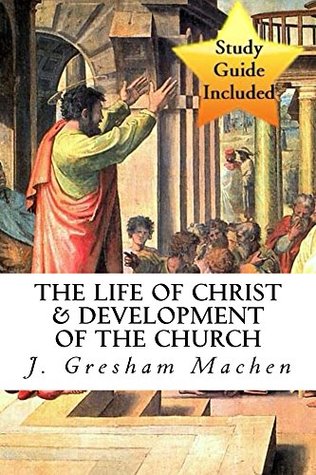- Bíblia
- Leia a Bíblia
- Versões da Bíblia
- Verso do dia
- Planos de Leitura
- Versos por Tópico
- Books of the Bible
- Imagens bíblicas
- Estude
- Comentários
- Concordâncias
- Dicionários
- Enciclopédias
- Sermões
- Bible Atlas & Maps
- BP Wiki
- Devocionais
- Devocionais de hoje
- Light of the World
- Todos os devocionais
- Inspirational Quotes
- Mais
- Picture Quotes
- Videos
- Inspirador
- Estudo da Bíblia
- O que a Bíblia diz
- Bible Q&As
- Daily Bread
- Bible by Genre
- Bible Stories
- Random Bible Verse
- Comunidade
- Store
The Life of Christ & Development of the Church: with Study Guides
by J. Gresham Machen
Please see the description for this title below. But first...
Our promise: All of our works are complete and unabridged. As with all our titles, we have endeavoured to bring you modern editions of classic works. This work is not a scan, but is a completely digitized and updated version of the original. Unlike, many other publishers of classic works, our publications are easy to read. You won't find illegible, faded, poor quality photocopies here. Neither will you find poorly done OCR versions of those faded scans either with illegible "words" that contain all kinds of strange characters like £, %, &, etc. Our publications have all been looked over and corrected by the human eye. We can't promise perfection, but we're sure gonna try! Our goal is to bring you high quality Christian publications at rock bottom prices.
At the time when the Old Testament narrative closes, the Jews were under the rule of Persia. The Persian control continued for about one hundred years more, and then gave way to the empire of Alexander the Great. Alexander was king of Macedonia, a country to the north of Greece; but the language and culture of his court were Greek. After Greece proper had been conquered by Alexander’s father, Philip, Alexander himself proceeded to the conquest of the East. The Persian Empire fell in 331 B.C., and with the other Persian possessions Jerusalem came into the hands of the conqueror. In 323 B.C., when Alexander died, his vast empire, which extended around the eastern end of the Mediterranean Sea and to the borders of India, at once fell to pieces. But the kingdoms into which the empire was divided were to a large extent Greek kingdoms. Short-lived, therefore, as Alexander’s empire was, it had the permanent effect of spreading the Greek language and Greek civilization over the Eastern world. It became thus, as will be seen, one of the most important factors in the divine preparation for the gospel.
Our promise: All of our works are complete and unabridged. As with all our titles, we have endeavoured to bring you modern editions of classic works. This work is not a scan, but is a completely digitized and updated version of the original. Unlike, many other publishers of classic works, our publications are easy to read. You won't find illegible, faded, poor quality photocopies here. Neither will you find poorly done OCR versions of those faded scans either with illegible "words" that contain all kinds of strange characters like £, %, &, etc. Our publications have all been looked over and corrected by the human eye. We can't promise perfection, but we're sure gonna try! Our goal is to bring you high quality Christian publications at rock bottom prices.
At the time when the Old Testament narrative closes, the Jews were under the rule of Persia. The Persian control continued for about one hundred years more, and then gave way to the empire of Alexander the Great. Alexander was king of Macedonia, a country to the north of Greece; but the language and culture of his court were Greek. After Greece proper had been conquered by Alexander’s father, Philip, Alexander himself proceeded to the conquest of the East. The Persian Empire fell in 331 B.C., and with the other Persian possessions Jerusalem came into the hands of the conqueror. In 323 B.C., when Alexander died, his vast empire, which extended around the eastern end of the Mediterranean Sea and to the borders of India, at once fell to pieces. But the kingdoms into which the empire was divided were to a large extent Greek kingdoms. Short-lived, therefore, as Alexander’s empire was, it had the permanent effect of spreading the Greek language and Greek civilization over the Eastern world. It became thus, as will be seen, one of the most important factors in the divine preparation for the gospel.
BUY NOW
Kindle Edition, 107 pages
Published December 6th 2016 by CrossReach Publications
Se inscrever
© 2025 Bibleportal.com Todos os direitos reservados.

Born in Baltimore, Maryland, he came from a wealthy and well-educated background. He studied at John Hopkins University and then went to Princeton Theological Seminary, receiving an M.A. in philosophy. He studied in Germany and returned to teach New Testament at Princeton. He received his B.D. in 1905 and was ordained in the Presbyterian Church.
In 1929, he left Princeton Seminary when the institution capitulated to the liberal faction, and he, along with others, founded Westminster Theological Seminary. In 1934 he was censured by the Presbyterian Church for his actions in relation to the Presbyterian Board of Foreign Missions, the liberal bias of which he opposed. In 1935 he was defrocked by the Presbyterian Church over major doctrinal issues. Machen then established the Orthodox Presbyterian Church as a reaction to the liberalism of the Presbyterian hierarchy. He died at age 55, of pneumonia.
... Show more